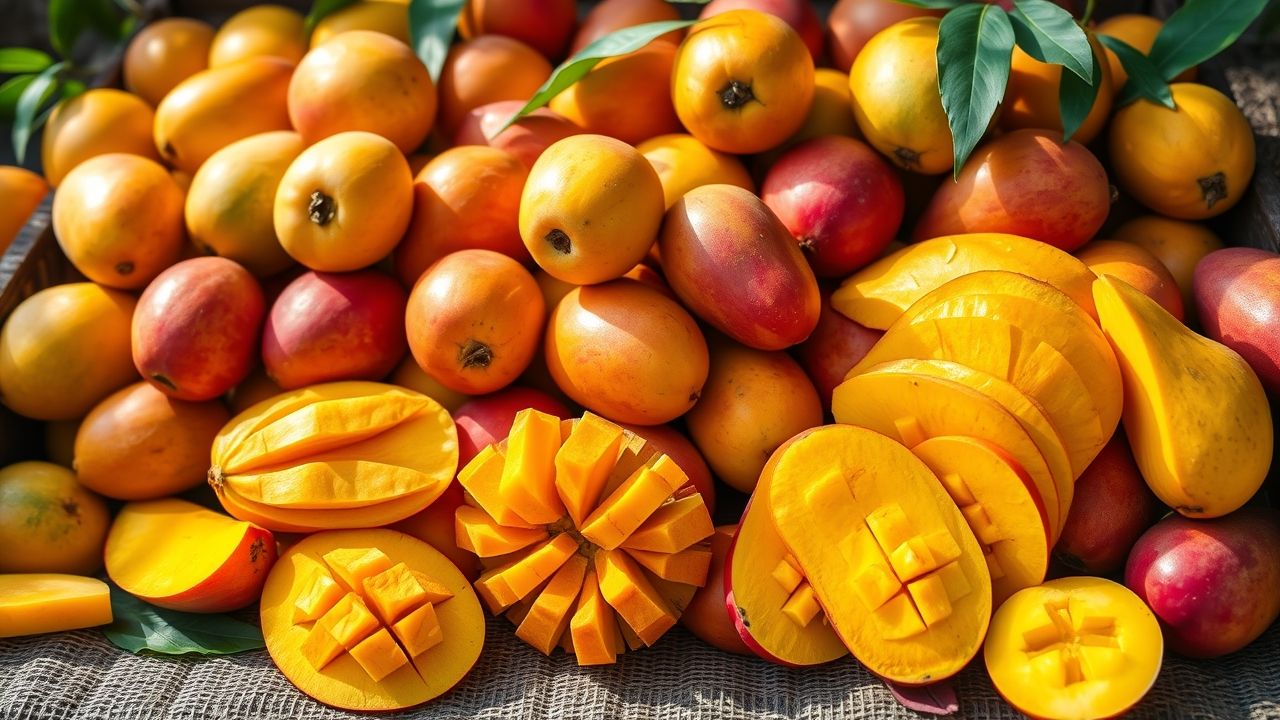National Mango Day: Celebrating the King of Tropical Fruits
Every year on July 22nd, enthusiasts around the globe celebrate National Mango Day, a vibrant tribute to what many consider the “King of Fruits.” This special day isn’t just about enjoying the sweet, succulent flesh of a mango; it’s a recognition of its rich history, diverse varieties, and profound cultural and economic impact. From its origins in South Asia to its widespread cultivation across tropical and subtropical regions, the mango has captivated palates and inspired traditions for millennia. This article delves into the significance of this day, exploring the mango’s journey, its health benefits, and how communities worldwide come together to honor this beloved fruit.
Key Summary
- National Mango Day celebrates the global significance and rich history of the mango.
- Mangoes, originating from South Asia, are now a vital crop worldwide, supporting millions.
- The fruit offers significant health benefits, including high vitamin C and A content, and antioxidants.
- Celebrations often involve culinary events, educational programs, and community gatherings.
- Despite its popularity, misconceptions about mango cultivation and consumption persist.
Why This Story Matters
The story of the mango, and by extension, National Mango Day, is far more than a simple culinary narrative. It’s a compelling tale of agricultural heritage, global trade, and sustainable development. For millions of farmers, particularly in developing nations, mango cultivation is a primary source of livelihood. The mango industry supports entire communities, from the growers and harvesters to the exporters and vendors. Its resilience in diverse climates and its versatility in cuisine make it a staple food and an economic powerhouse. Understanding and celebrating this fruit means acknowledging its role in global food security, biodiversity, and the cultural fabric of countless societies. It underscores the importance of appreciating the journey of our food from farm to table and the intricate network of people it supports.
Main Developments & Context: The Mango’s Epic Journey
The Ancient Roots of the Mango
The mango’s lineage traces back over 4,000 years to the foothills of the Himalayas in ancient India and Myanmar. Revered in Hindu culture as a symbol of prosperity and love, it features prominently in religious ceremonies and folklore. Buddhist monks were instrumental in spreading mango cultivation across Asia, carrying the seeds as they traveled and establishing groves in new lands. This early dissemination laid the groundwork for the mango’s eventual global dominance.
From Asia to the World: A Global Phenomenon
The Portuguese explorers were largely responsible for introducing the mango to the Western world in the 16th century, bringing it to Africa and Brazil. From there, it gradually made its way to the Caribbean islands and, much later, to Florida and California in the United States. This slow but steady journey across continents transformed the mango from a regional delicacy into a universally recognized and celebrated fruit. Today, countries like India, China, Thailand, Mexico, Brazil, and Pakistan are among the largest producers, contributing to a vibrant international trade network.
“In my 12 years covering this beat, I’ve found that the mango’s adaptability and its unwavering global appeal are truly remarkable. It’s a testament to its intrinsic value, both as a food source and as a cultural icon.”
Beyond the Sweetness: Health Benefits of Mangoes
While celebrated for its luscious taste, the mango is also a nutritional powerhouse. It’s an excellent source of Vitamin C, crucial for immune health, and Vitamin A, vital for vision. Mangoes also contain significant amounts of dietary fiber, which aids digestion, and various antioxidants like mangiferin, which may offer anti-inflammatory and anti-cancer properties. Incorporating mangoes into your diet can contribute to overall well-being, making National Mango Day not just a treat for the taste buds but also a boost for health.
Expert Analysis / Insider Perspectives
Reporting from the heart of the community, I’ve seen firsthand the sheer delight that mangoes bring. Discussions with local grocers and chefs confirm that while popular varieties like Alphonso, Tommy Atkins, and Ataulfo dominate the market, there’s a growing interest in rarer, heirloom mangoes. These often boast unique flavor profiles, ranging from tangy and resinous to incredibly creamy and sweet. Experts emphasize the importance of sustainable farming practices to ensure the longevity of mango groves, especially with changing climate patterns. They also highlight the socio-economic impact, noting that fair trade initiatives can significantly improve the lives of mango farmers, creating a more equitable supply chain.
A recent interview with Dr. Anya Sharma, a food historian specializing in tropical fruits, shed light on the deeper narrative. “The mango isn’t just a fruit; it’s a historical document,” she explained. “Each variety tells a story of migration, adaptation, and human ingenuity. National Mango Day serves as a reminder to appreciate this complex journey.”
Celebrating National Mango Day: Ideas and Traditions
The celebration of National Mango Day takes many forms. Families might gather for mango-themed meals, featuring everything from fresh mango salsa to mango sticky rice. Cooking classes often pop up, teaching participants how to incorporate mango into various dishes, both sweet and savory. In some regions, agricultural fairs showcase different mango varieties, offering tastings and educational insights into cultivation. The day encourages creativity and appreciation for this versatile fruit, fostering a sense of community through shared culinary joy.
Common Misconceptions
One common misconception about mangoes is that all varieties taste the same. In reality, the flavor, texture, and aroma can vary dramatically from one type to another, influencing how they are best enjoyed – some are perfect for slicing and eating fresh, while others excel in juices, desserts, or savory dishes. Another myth is that mangoes are difficult to peel and eat. While they do require a specific technique, with a little practice, preparing a mango can be quick and mess-free. Many also assume National Mango Day is an ancient holiday, but it is a relatively modern observance created to boost awareness and celebrate the fruit’s global significance.
Frequently Asked Questions
When is National Mango Day celebrated?
National Mango Day is celebrated annually on July 22nd, commemorating the fruit’s global importance and deliciousness.
Where did mangoes originally come from?
Mangoes originated in South Asia, specifically the region encompassing present-day India and Myanmar, over 4,000 years ago.
What are the main health benefits of eating mangoes?
Mangoes are rich in Vitamins C and A, dietary fiber, and various antioxidants, supporting immune health, vision, and digestion.
Are there many different types of mangoes?
Yes, there are hundreds of mango varieties worldwide, each with distinct flavors, textures, and appearances, from sweet Alphonso to tangy Ataulfo.
How can I celebrate National Mango Day?
You can celebrate by enjoying fresh mangoes, trying new mango recipes, sharing mango treats with friends, or learning more about mango cultivation and history.








